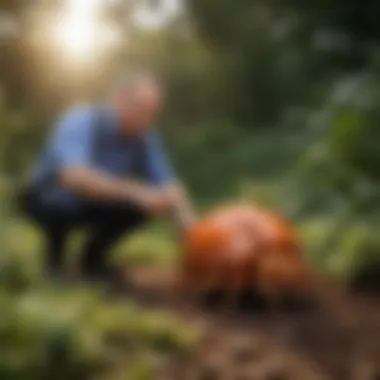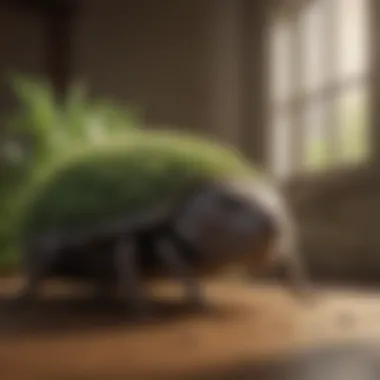Mid Cape Pest Control: Eco-Friendly Strategies


Intro
Pest control is not just a matter of convenience; it is often a necessary aspect of maintaining a healthy living environment. Especially in areas like Mid Cape, where the climate and ecosystem create an ideal habitat for various pests, understanding the nuances of pest management is critical. Homeowners and garden enthusiasts face numerous challenges ranging from insects to rodents, all requiring effective strategies to mitigate their impact.
This article offers a comprehensive look into pest control in the Mid Cape area, featuring various approaches, sustainable solutions, and the importance of identifying pests accurately. By emphasizing integrated pest management and eco-friendly methods, readers will gain insight into practical solutions that promote both effectiveness and sustainability.
Understanding Pests
Definition of Pests
Pests often refer to organisms that cause damage to property, crops, or are detrimental to human health. These include insects, rodents, and even some plants that outcompete desirable species. Understanding what constitutes a pest can vary based on context, as some insects are beneficial to ecosystems while others can be destructive.
Importance of Pest Identification
Identifying pests accurately is a crucial step in managing them effectively. Misidentification can lead to ineffective treatment and further complications. For instance, distinguishing between beneficial insects like ladybugs and harmful ones like aphids is essential for a balanced garden ecosystem. Homeowners should familiarize themselves with common pests in the Mid Cape region to take informed steps towards control.
Prevention Techniques
Home and Garden Preventative Measures
Preventative techniques are vital for minimizing pest issues. Here are some key strategies:
- Seal Entry Points: Inspect and repair cracks and openings in your home. Rodents can enter through small spaces, while insects can find their way in through unsealed doors and windows.
- Proper Waste Management: Dispose of food waste properly and keep trash cans tightly sealed. This reduces attractants for pests.
- Maintain Landscape: Regular lawn maintenance, including trimming overgrown bushes and removing debris, helps minimize hiding spots for pests.
Seasonal Prevention Tips
Each season presents unique challenges for pest control. Here are some tailored strategies:
- Spring: Conduct a thorough spring cleaning to eliminate debris and prepare your garden.
- Summer: Utilize natural repellents like neem oil to protect plants from common infestations.
- Fall: Focus on sealing potential entry points as pests seek warmth indoors.
- Winter: Regularly monitor for signs of pest activity within your home.
Eco-Friendly Pest Control Solutions
Overview of Sustainable Practices
Adopting eco-friendly pest control solutions is essential for promoting a healthier environment. Integrated Pest Management (IPM) focuses on using a combination of techniques, including biological control, habitat manipulation, and cultural practices. This approach minimizes reliance on chemicals and promotes long-term sustainability.
Natural Remedies and Their Effectiveness
Natural remedies can be an effective way to manage pests while minimizing chemical use. Here are some popular options:
- Diatomaceous Earth: This natural powder can help control a variety of insect pests by dehydrating them.
- Essential Oils: Oils such as peppermint and lavender can deter pests when used as sprays.
- Homemade Traps: Simple traps made from household items can capture common pests like fruit flies and wasps effectively.
By employing eco-friendly methods, homeowners contribute to a sustainable ecosystem while effectively managing pest populations.
Through understanding pests, implementing prevention techniques, and exploring eco-friendly control methods, residents in Mid Cape can tackle pest challenges head-on. This article aims to empower homeowners with knowledge, leading to a safe and enjoyable living environment.
Prelims to Mid Cape Pest Control
Pest control is not simply a remedy for existing infestations; it is a crucial process for maintaining the balance between human habitats and the natural ecosystem. In the context of Mid Cape, a region rich in biodiversity, understanding the dynamics of pest behavior and environmental factors becomes vital. For homeowners and gardeners alike, having a sound grasp of pest control methods can minimize damage to crops and property, while ensuring a healthier living space.
Understanding the Pest Problem
Pests, whether insects, rodents, or other creatures, often find their way into homes and gardens, prompted by factors such as food availability, shelter, or even climate change. In Mid Cape, the subtropical conditions can lead to significant pest populations if not managed proactively. The common pests in this area include ants, termites, and ticks, each presenting distinct challenges. Acknowledging the pest problem is the first step in effectively addressing it. Homeowners need to recognize not just the presence of these pests, but also the reasons behind their proliferation. This understanding is fundamental for developing management strategies that are both efficient and sustainable.
The Environment of Mid Cape


The Mid Cape region boasts diverse ecosystems, from coastal areas to woodlands. The unique environment here favors certain pests that may thrive in specific conditions. For instance, humidity levels in coastal regions can encourage mold growth and attract pests that feed on organic material.
In gardens, the selection of plant species greatly influences pest populations. Native plants, beneficial insects, and proper soil management can act as natural barriers against pests. Homeowners should take time to learn about their local environment. Understanding what attracts pests in the Mid Cape can lead to more informed decisions about pest prevention and control.
An integrated approach that considers these environmental factors will yield better results. It involves not just reactive measures, but proactive ones that address the root causes of pest problems. This insight will empower gardeners and homeowners to create spaces that inherently discourage pest invasions, aligning their practices with sustainable living principles.
Common Pests in the Mid Cape Region
The Mid Cape area is famous for its rich biodiversity. However, this diversity also includes a variety of pests that can disrupt local ecosystems and affect homes. Knowing which pests are common in this region allows homeowners to prepare accordingly. Identifying prevalent pests can lead to proactive measures that protect homes and gardens from potential damage.
Insect Identification Techniques
Identifying insects accurately is crucial for effective pest management. Various methods exist to assist homeowners in recognizing these pests. Observing physical characteristics is fundamental, such as looking at color, size, and specific markings. Insects like the common carpenter ant or the Asian tiger mosquito require precise identification for appropriate treatments.
Utilizing online resources can enhance identification skills. Websites like Wikipedia and Britannica offer extensive information on insect species. Furthermore, mobile apps are available that can help in recognizing pest types through image capture. This technology empowers homeowners to take necessary steps based on correct identifications, thus preventing potential infestations.
Seasonal Pest Patterns
Pest populations fluctuate with the changing seasons in Mid Cape. Understanding these patterns assists in anticipating pest activity. For instance, spring often welcomes a surge in ant populations as they search for food and nesting sites. During summer, mosquitoes may become a significant issue due to increased humidity.
Fall can witness the emergence of rodents seeking shelter from colder weather. Recognizing these seasonal patterns means homeowners can implement preventative measures at the right time. Beyond mere observation, keeping a pest calendar can help track these changes and plan maintenance tasks accordingly.
Impact of Local Wildlife on Pest Populations
Local wildlife plays a notable role in shaping pest dynamics. Predators such as birds of prey actively reduce rodent populations, while beneficial insects like ladybugs control aphid growth. Understanding this ecological balance helps homeowners see pests in a broader context.
However, human activities can disrupt these natural controls. Pesticide use can harm non-target species, leading to increased pest populations in the long run. Respecting and fostering wildlife habitats can enhance the natural pest control services provided by these creatures.
"Understanding the balance of local ecosystems is essential for sustainable pest management."
In summary, knowledge of common pests and their behaviors in the Mid Cape region allows homeowners to tackle pest issues more effectively. Identifying pests correctly, predicting seasonal activities, and utilizing local wildlife can create a holistic approach to pest management.
Integrated Pest Management (IPM)
Integrated Pest Management (IPM) represents a significant strategy when addressing pest issues, particularly in the Mid Cape region. This approach combines various management practices to minimize pest populations while promoting sustainable environmental health. Unlike traditional pest control methods that often rely heavily on chemicals, IPM focuses on understanding pest life cycles, their natural enemies, and the dynamics of the ecosystem.
The benefits of IPM are manifold. This holistic method not only reduces the dangers associated with chemical pesticides but also decreases the chances of pest resistance. By employing various strategies, a homeowner can create a less hospitable environment for unwanted pests without the adverse effects of synthetic pesticides.
Some considerations regarding IPM include the need for careful planning and monitoring. Homeowners should regularly observe their gardens and homes for any signs of pest activity, and accurate identification is crucial. The initial effort might seem significant, but the long-term environmental and health benefits of IPM justify the commitment.
Principles of IPM
The foundation of IPM lies in a series of principles aimed at effective pest management. These principles guide homeowners and professionals alike. They include:
- Prevention: This involves creating unfavorable conditions for pest infestation, such as proper sanitation and habitat management.
- Monitoring: Regularly checking for pests can help in understanding their population dynamics and environmental conditions.
- Identification: Knowing what pests are present allows for the application of targeted control strategies.
- Management: Utilizing a combination of mechanical, physical, biological, and chemical controls to manage pest populations without causing harm to the environment.
These principles ensure a comprehensive approach to pest management that balances efficacy and safety.
Monitoring and Assessment Techniques
Monitoring is a vital part of any IPM program. By observing pest populations and their behaviors, homeowners can take steps to control them more effectively. Some common techniques include:
- Trap Placement: Using traps can help catch pests and provide data on population levels.
- Regular Observations: Daily checks during the growing season help in recognizing early signs of damage or infestation.
- Notes & Images: Keeping a log of findings assists in tracking trends over time, allowing for more informed decisions.
Such techniques are essential for deciding when and how to intervene, minimizing unnecessary treatments that could harm beneficial organisms.
Cultural Control Measures


Cultural control measures are essential components of an IPM strategy. They focus on altering practices that impact pest populations. This can include:
- Crop Rotation: Changing the types of plants grown in a specific area to disrupt pest life cycles.
- Soil Management: Maintaining healthy soil can increase plant resilience to pests.
- Water Management: Ensuring proper drainage helps reduce conditions that may favor certain pests.
Implementing these measures not only helps in deterinng pests but also promotes a sustainable agricultural environment. The focus on cultural controls leads to healthier plants overall and contributes to improved soil health and ecological balance.
Utilizing Integrated Pest Management is a proactive approach for homeowners who wish to protect their living spaces and gardens while maintaining a commitment to environmental stewardship.
Eco-Friendly Pest Control Solutions
The shift towards eco-friendly pest control solutions represents a growing awareness of the environmental and health implications of traditional pest management methods. Homeowners are increasingly looking for sustainable options to protect their homes and gardens without harming the ecosystem. Eco-friendly methods prioritize long-term pest suppression rather than quick fixes, fostering a balanced approach to pest management.
One significant benefit of choosing eco-friendly pest control is the reduction of chemical exposure. Conventional pesticides often contain toxic substances that can pose risks to both humans and pets. By opting for eco-friendly solutions, individuals can minimize the chances of allergic reactions and health complications. Additionally, sustainable practices often bolster biodiversity by protecting beneficial insects and wildlife, which play essential roles in pollination and pest regulation.
Considering that the Mid Cape region has delicate ecosystems, adopting eco-friendly pest control practices ensures that local flora and fauna are preserved. With this approach, it is possible to significantly reduce pest populations while maintaining ecological balance. Below, we will explore specific eco-friendly methods that homeowners can implement effectively.
Organic Pesticides
Organic pesticides offer a safer alternative for managing pest issues. These products are derived from natural sources, such as plants, minerals, or microorganisms, and are designed to target pests without causing extensive harm to non-target species. Examples include neem oil, diatomaceous earth, and insecticidal soap.
Homeowners in Mid Cape can benefit from organic pesticides by utilizing them in their gardens and backyards. They often break down more quickly than synthetic options, minimizing any residual impact on the environment. Moreover, organic pesticides tend to have lower toxicity levels, making them safer for use around children and pets. It is essential to note that while organic pesticides can be effective, they often require more frequent applications, as they may not provide the same prolonged protection as synthetic chemicals.
Biological Control Agents
Biological control agents are another aspect of eco-friendly pest management. This method involves the use of natural predators, parasites, or pathogens to control pest populations. For instance, ladybugs feed on aphids, which are common garden pests. By encouraging predators or introducing beneficial insects, homeowners can effectively manage pest populations without pesticides.
The environment of Mid Cape is suitable for various beneficial species. Homeowners may consider planting specific flowers that attract these natural predators. This allows for a self-sustaining pest control ecosystem that requires minimal intervention.
"Biological control agents can significantly reduce pest populations, often complementing other management strategies to enhance effectiveness."
DIY Pest Control Methods
For those who prefer a hands-on approach, DIY pest control methods can be both effective and sustainable. Simple techniques can include natural repellents made from common household items. For example, a solution of vinegar and water can deter ants from invading kitchens, while soap and water can be used to treat soft-bodied insects.
Other strategies include setting up traps or using barriers to prevent pests from entering homes or gardens. Proper sanitation practices also play a vital role in pest prevention. Keeping living spaces tidy, removing food sources, and sealing entry points can discourage pests from taking residence.
In summary, eco-friendly pest control solutions provide a variety of effective strategies that align with environmental sustainability. By implementing organic pesticides, biological control agents, and DIY pest control methods, homeowners in Mid Cape can tackle pest issues while keeping their surroundings healthier and contributing positively to the ecosystem.
Preventive Measures for Homeowners and Gardeners
Preventive measures are critical in pest control, especially for homeowners and gardeners. This section emphasizes the significance of adopting proactive strategies to manage pest populations effectively. By understanding and implementing these measures, homeowners can protect their properties and gardens, reducing reliance on chemical treatments and fostering a healthier environment.
Understanding Pest Behavior
Understanding pest behavior is the cornerstone of effective pest prevention. Different pests have unique habits. For example, ants are social insects that come in colonies, while termites are known for affecting the structural integrity of buildings. Recognizing the signs of potential infested areas is essential. Homeowners should be aware of when specific pests are most active, which can vary by season. Conducting regular inspections of indoor and outdoor spaces helps identify problems before they escalate. Awareness of common entry points and nesting habits can also inform preventive measures. By learning about the preferences and life cycles of pests, one can better anticipate their activities.
Physical Barriers and Exclusions
Physical barriers and exclusions constitute straightforward yet efficient methods to prevent pests from intruding into homes and gardens. Screening windows and doors, sealing cracks, and using weather stripping can deter insects from entering living spaces. Additionally, installing fencing or mesh around garden beds protects against larger pests such as rabbits or deer. The effectiveness of these measures is heightened when combined with regular maintenance of the home’s exterior. For instance, ensuring gutters are clean and removing debris from foundations of buildings can eliminate harborage sites that pests favor.
Gardening Practices to Deter Pests
Gardening practices play a pivotal role in pest management. Implementing companion planting is one strategy that can help. Some plants naturally repel pests, while others can attract beneficial insects. For example, marigolds are known to deter nematodes, and herbs like basil can repel flies and mosquitoes. Moreover, ensuring that plants are healthy and well-maintained reduces their susceptibility to pests.
It is also valuable to practice crop rotation. Switching plant families from one garden bed to another can inhibit pest cycles and soil-borne diseases. Keeping gardens tidy, removing dead plant material, and controlling weeds can minimize environments that favor pest infestations.
"Prevention is better than cure"—This adage rings particularly true in pest control.


By focusing on these preventive measures, homeowners and gardeners can create an environment that limits pest establishment and enhances the overall health of their spaces.
Professional Pest Control Services
Pest control is a critical aspect of home maintenance, particularly for those living in regions with high levels of pest activity like Mid Cape. Professional pest control services offer expertise and resources that homeowners may not possess. Their knowledge can significantly impact the effectiveness of pest management.
Not only do these services deal with immediate infestations, but they also help in preventing future issues. The professionals assess the specific pest problem, identify the most effective and safest methods for eradication, and often use products that are not available to the general public. This level of expertise is crucial, especially because some pests can pose serious health risks or cause significant property damage.
Additionally, using a professional pest control service can save homeowners time and money in the long run. While there is an upfront cost, the likelihood of successful eradication reduces the need for repeated treatments or major repairs caused by pest damage.
"Employing professional pest control is not about simply exterminating pests; it's about ensuring a safe and healthy living environment."
Understanding when to bring in the professionals is key to maintaining a pest-free home.
Assessing When to Call Professionals
Homeowners may wonder when it is appropriate to seek professional help in managing pest issues. If you are dealing with a persistent infestation that DIY methods have failed to eradicate, it is advisable to call in experts. Additionally, signs of significant structural damage, such as holes or droppings, suggest the presence of serious pests like termites or rodents.
Some indicators can help determine the need for a professional:
- Severity of Infestation: If pests are multiplying rapidly.
- Health Risks: When pests pose potential health hazards, such as cockroaches and rodents.
- Damage Evidence: Visible signs of damage on property or furniture.
- Persistence: When DIY solutions have proven ineffective.
Recognizing these symptoms alerts homeowners to the importance of prompt action, as delay may result in increased costs and hassle.
Choosing the Right Pest Control Provider
Selecting an appropriate pest control provider is essential for effective pest management. Homeowners should consider several factors during this process. First, verify the company's credentials. Providers should have licensing, insurance, and certifications that indicate they comply with local regulations.
Reading reviews and checking references can also provide insight into a company's reputation. Understanding service offerings is crucial, too. Different providers may specialize in certain types of pest control or eco-friendly methods.
Key elements to assess when choosing a provider include:
- Experience: Look for providers with a strong track record.
- Techniques Used: Ensure they use methods you're comfortable with, including eco-friendly options if desired.
- Customer Service: An initial consultation can indicate how the company treats potential clients.
Taking the time to research and choose wisely can enhance the likelihood of a satisfactory resolution for pest issues.
Understanding Pest Control Terminology
Understanding the jargon used in pest control can demystify the process for homeowners. Familiarizing oneself with common terms can lead to clearer communication with pest control providers and better-informed decisions.
Some terms to know include:
- Integrated Pest Management (IPM): A sustainable approach combining multiple techniques.
- Exclusion: Measures taken to keep pests from entering a structure.
- Baiting: Using bait to attract and kill pests, often used in rodent control.
- Residual Treatment: Application of chemicals that remain effective for extended periods.
By grasping this terminology, homeowners can make informed choices concerning their pest management strategies. Engaging with professional services can lead to a healthier living environment while affirming the need for continual education in pest management.
Ending
The conclusion of this article serves as a critical reflection on sustainable pest control practices in the Mid Cape region. It synthesizes the core themes discussed throughout the sections, emphasizing the importance of adopting a responsible approach to pest management. Sustainable practices not only help in keeping homes pest-free but also minimize the harmful impact on the environment.
Reflecting on Sustainable Practices
Sustainable pest control encompasses a range of techniques that harmonize with environmental principles. This includes the utilization of organic pesticides, the integration of biological control agents, and the application of Integrated Pest Management (IPM). Reflecting on sustainability means recognizing that our actions today affect future generations. Homeowners in the Mid Cape can adopt these eco-friendly practices as responsible stewards of their land. By implementing sustainable strategies, they foster a healthier ecosystem while managing pest populations effectively.
Ultimately, choosing sustainable pest control means supporting local wildlife, reducing chemical usage, and improving soil health. These practices are especially relevant in the diverse habitats found in the Mid Cape region. Encouraging community dialogues on these topics can inspire more individuals to reconsider their pest management methods.
Encouragement for Continued Learning
Knowledge is essential in effectively managing pests and sustaining the environment. Homeowners should be encouraged to seek further education on pest behavior, management techniques, and environmental impacts.
Reading articles, attending local workshops, or participating in community programs can enhance understanding and skills. Resources such as Wikipedia provide an excellent foundation for learning about pests and sustainable methods. Additionally, local extension services often offer expertise tailored to specific regional challenges.
By committing to ongoing education, homeowners can make informed decisions. This involves not only understanding pest issues but also finding innovative solutions that meet their unique needs. The insights gained will empower them to address problems proactively, ultimately creating a safer and more sustainable home lives.
"Sustainability in pest management is not just about eliminating pests; it's about maintaining the balance within our ecosystems."
Together, through reflection and continuous learning, homeowners and gardeners can cultivate practices that ensure both personal and environmental health. Each step taken toward sustainability contributes to a larger movement for ecological balance in our world.



